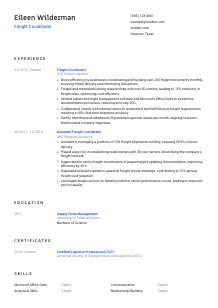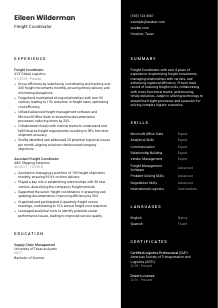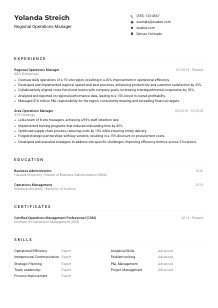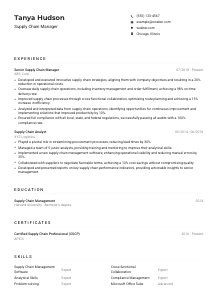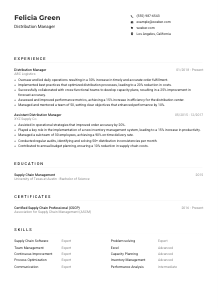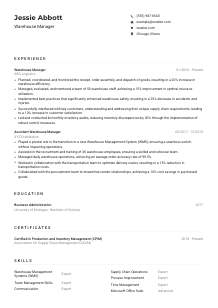Freight Coordinator Resume Example
Moving cargo, but your resume feels stuck? Navigate this Freight Coordinator resume example, mapped out with Wozber free resume builder. Discover how to chart your logistical know-how to align with job expectations, ensuring your career sails smoothly and freight-fully ahead!
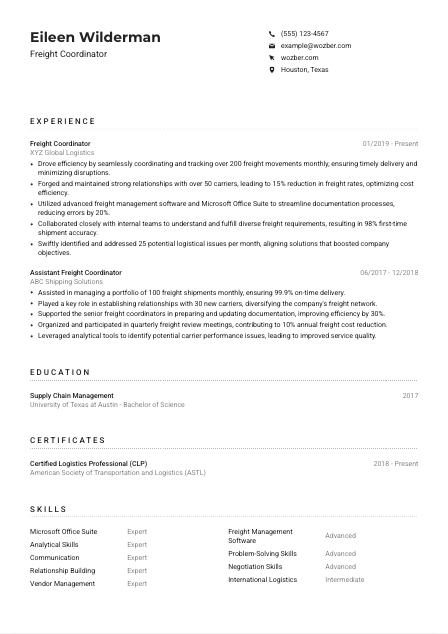
How to write a Freight Coordinator Resume?
Hello, aspiring Freight Coordinator! In the bustling and dynamic field of logistics, standing out with a top-notch resume is your golden ticket. Think of your resume as your personal freight manifest, listing your invaluable cargo - your skills, experience, and credentials.
Using the Wozber free resume builder, this guide will navigate you through the intricacies of crafting an ATS-compliant resume that sails smoothly through applicant tracking systems and lands you the Freight Coordinator role you're aiming for. Get ready to anchor your strengths in a resume that charts a successful career journey!
Personal Details
Let's begin with the charting course for the essential first contact; your personal details section. In the world of Freight Coordinating, where details are vital, starting correctly sets the course for success.
1. Showcase Your Name Boldly
Your name is the beacon that guides recruiters through your resume. Make sure it shines bright, clear, and undeniably visible with a font that marks its importance. It's the flag of your professional ship.
2. Job Title Precision
Immediately below your name, state your aim: the job title you're pursuing, in this case, "Freight Coordinator." This aligns your resume to the desired role like a compass aligning to the north, showing you're exactly where you need to be.
3. Clear Channels of Communication
Ensure your contact information is as reliable as a lighthouse. A professional email and a phone number without typos are must-haves. It's like maintaining open radio channels for smooth operations.
4. Location as a Key Coordinate
The job asks for someone in or able to relocate to Houston, Texas. By stating "Houston, Texas" as your location, you're confirming your readiness to be part of the local freight network.
5. Web Presence
A LinkedIn profile or a personal website can serve as the digital portfolio of your professional voyage. Ensure it's trimmed to perfection, mirroring the precision and reliability of your resume.
Takeaway
Your personal details are the first coordinates on your professional map, guiding recruiters to your professional doorstep. Ensure these are accurate and perfectly aligned with the targeted role, setting the stage for a stellar first impression.





Experience
The experience section is the heart of your resume, showcasing the voyages you've undertaken and the seas you've navigated. Let's ensure your experience speaks the language of a skilled Freight Coordinator.
- Drove efficiency by seamlessly coordinating and tracking over 200 freight movements monthly, ensuring timely delivery and minimizing disruptions.
- Forged and maintained strong relationships with over 50 carriers, leading to 15% reduction in freight rates, optimizing cost efficiency.
- Utilized advanced freight management software and Microsoft Office Suite to streamline documentation processes, reducing errors by 20%.
- Collaborated closely with internal teams to understand and fulfill diverse freight requirements, resulting in 98% first‑time shipment accuracy.
- Swiftly identified and addressed 25 potential logistical issues per month, aligning solutions that boosted company objectives.
- Assisted in managing a portfolio of 100 freight shipments monthly, ensuring 99.9% on‑time delivery.
- Played a key role in establishing relationships with 30 new carriers, diversifying the company's freight network.
- Supported the senior freight coordinators in preparing and updating documentation, improving efficiency by 30%.
- Organized and participated in quarterly freight review meetings, contributing to 10% annual freight cost reduction.
- Leveraged analytical tools to identify potential carrier performance issues, leading to improved service quality.
1. Map Out Relevant Voyages
Begin with an inventory of your experiences, highlighting roles that demonstrate your capability in freight coordination. Like sorting through a cargo list, pinpoint what's most relevant to the role at hand.
2. Organize Your Log
Structure your experience chronologically, starting with your most recent role. This presents a clear timeline of your professional journey, making it easy for hiring managers to track your growth in the industry.
3. Detail Your Contributions
For each role, describe your achievements with precision. Use phrases like "Ensured timely delivery by coordinating over 200 freight movements monthly," to paint a clear picture of your capabilities and impact.
4. Quantify Your Cargo
Numbers speak volumes in logistics. Quantifying your achievements, like reducing freight costs by 15%, adds weight to your claims and showcases your value as a Freight Coordinator.
5. Keep It Shipping-Relevant
Stay focused on experiences directly related to freight coordination. Extraneous details are like unnecessary cargo; they weigh down your resume and distract from your core strengths.
Takeaway
Your experience section charts the course of your professional journey. By detailing relevant experiences and quantifying your achievements, you create a compelling narrative that convinces hiring managers you're set to sail in the role of a Freight Coordinator.
Education
In the logistics of your career, your education section anchors your foundational knowledge. Let's ensure this section reflects the specific qualifications that make you a standout candidate for the Freight Coordinator role.
1. Identify the Required Educational Benchmark
The job description calls for a "Bachelor's degree in Supply Chain Management, Logistics, or related field." Ensuring your education aligns with this requirement is like ensuring your ship meets the necessary specifications for the voyage.
2. Structure with the Precision of a Cargo Manifest
Maintain clarity and conciseness in listing your educational background. This isn't the time for overloading; keep it streamlined—degree, field of study, and institution.
3. Match Your Degree
Make sure your degree is accurately listed and matches the job requirements. Listing a "Bachelor of Science in Supply Chain Management" demonstrates you have the right cargo on board.
4. Additional Credentials
While not always necessary, highlighting relevant coursework, honors, or extracurricular activities related to logistics can add depth to your educational background, showcasing you as a well-rounded candidate.
5. Certifications and Continuous Learning
In a field that values precision and up-to-date knowledge, listing certifications such as a Certified Logistics Professional (CLP) can significantly bolster your qualification, much like reliability boosts a freight carrier's reputation.
Takeaway
Your education section is a testament to your foundational expertise in logistics and supply chain management. It assures employers that you have the necessary knowledge and credentials to tackle the demands of a Freight Coordinator role efficiently.
Certificates
In the realm of freight coordination, certifications are like seals of approval on your professional capabilities. They signify your dedication to excellence and continuous improvement. Let's navigate how to list them effectively.
1. Ascertain Job-Related Certifications
Though the job description doesn't explicitly list required certifications, having them can set you apart. Certifications like Certified Logistics Professional (CLP) echo your commitment and expertise in the field.
2. Highlight Critical Certificates
Focus on certifications most relevant to the Freight Coordinator role. This ensures that hiring managers immediately see the value you bring and your dedication to the profession.
3. Date Relevance
Include the validity of your certifications to show your credentials are current. It's like ensuring your navigation charts are up to date for smooth sailing.
4. Continuous Professional Development
Emphasize any recent or ongoing certification courses to demonstrate your commitment to staying abreast in the ever-evolving logistics landscape. It shows you're steering your professional development in the right direction.
Takeaway
Your certifications are not just badges of honor; they're indicators of your professional growth and specialization in the logistics field. Carefully selected and showcased, they can significantly enhance your resume's appeal to prospective employers.
Skills
Your skills section is the compass that points towards your capabilities. In the world of freight coordination, both hard skills like using freight management software and soft skills like negotiation are your navigational stars. Let's plot them prominently.
1. Extract From the Job Description
Carefully read through the job description and list skills that match your profile. Skills like "Proficiency in freight management software" and "Excellent communication" are your guiding stars.
2. Prioritize Relevant Skills
Focus on listing skills that directly align with the job's demands. This assures hiring managers that you possess the right toolkit to efficiently navigate and manage freight coordination tasks.
3. Organize for Optimal Visibility
Arrange your skills in a way that the most relevant ones catch the eye first. Think of it as organizing a cargo bay for efficiency: the most critical items should be the most accessible.
Takeaway
The skills section of your resume is a curated showcase of your professional abilities. Handpicked and well-organized, it convinces the reader of your readiness and capability to excel as a Freight Coordinator. Let your skills shine brightly and guide your way to career success.
Languages
In freight coordination, where global interaction is common, language skills can set you apart as a candidate. They're the diplomatic channels that facilitate smooth cross-border operations. Let's make sure your linguistic capabilities are duly highlighted.
1. Check Job Language Requirements
The ability to operate in an English-speaking environment is a requirement for this role. Ensure that your proficiency in English is clearly indicated, showing you can easily navigate the international logistics waters.
2. Prioritize Essential Languages
Start with the languages most pertinent to the job. English, being a requirement, should be listed first, demonstrating that you meet the fundamental communication criterion.
3. List Additional Languages
Additional languages should follow in order of proficiency. This reflects your versatility and ability to coordinate freight beyond English-speaking contexts, broadening your appeal.
4. Honesty in Proficiency
Be accurate in assessing and stating your language levels. Over- or underestimating your language skills can lead to miscommunications down the line, potentially capsizing mutual expectations.
5. Understand the Role's Scope
While the job may primarily focus on English proficiency, mentioning additional languages showcases your potential to facilitate broader international logistics operations, making you a candidate of worldwide capability.
Takeaway
Your multilingual skills are not just about translation; they're about connecting, understanding, and navigating the global landscape of freight coordination. Embrace and display your linguistic capabilities as key assets in your professional toolkit.
Summary
Your summary is the flag under which you sail into the hiring manager's view. It encapsulates your professional journey, goals, and what you bring to the table as a Freight Coordinator. Let's draft it to catch the wind!
1. Absorb the Job Essence
Start by fully embracing the role's requirements. Reflect on how your experience, skills, and career objectives align with what the position entails.
2. Distill Your Professional Essence
Introduce yourself with a statement that highlights your years of experience and core competencies. For instance, mention your adeptness at optimizing freight movements and managing carrier relationships.
3. Showcase Your Unique Cargo
Detail the unique skills and achievements that you bring aboard. Link these directly to the job's needs, such as your proven track record in reducing freight costs and solving complex logistic scenarios.
4. Precision and Brevity
Keep your summary concise yet impactful. Think of it as plotting the most efficient route on a map; it should take the reader on a quick yet comprehensive tour of your professional landscape.
Takeaway
A well-crafted summary serves as your professional compass, pointing directly towards your fit for the Freight Coordinator role. It tells hiring managers why you're the right navigator for this journey, summarizing your expertise and aspirations with clarity and impact.
Launching Your Freight Coordinator Journey
Congratulations on embarking on this venture to craft a Freight Coordinator resume that stands out! With these navigational tips and Wozber's ATS-friendly resume template, you're well-equipped to create a document that showcases your skills, experience, and passion for logistics. Remember, your resume is more than a piece of paper; it's a testament to your professional journey and aspirations.
Utilize the Wozber free resume builder, including the ATS resume scanner for ATS optimization, to ensure that your resume not only meets the requirements but exceeds expectations. Hoist your sails, and let your career journey begin!

- Bachelor's degree in Supply Chain Management, Logistics, or related field.
- Minimum of 3 years of experience in freight coordination or related roles.
- Proficiency in using freight management software and Microsoft Office Suite.
- Strong analytical and problem-solving skills in navigating complex logistics scenarios.
- Excellent communication and negotiation skills with the ability to build and maintain relationships with carriers and suppliers.
- Ability to operate in an English-speaking work environment.
- Must be located in or able to relocate to Houston, Texas.
- Coordinate and track freight movements, ensuring timely delivery and minimizing disruptions.
- Manage relationships with carriers and negotiate freight rates to optimize cost efficiency.
- Prepare and maintain documentation related to freight activities, such as bills of lading, shipping orders, and customs documentation.
- Collaborate with internal teams to understand and fulfill freight requirements for shipments.
- Proactively identify and address potential logistical issues, working towards solutions that align with company objectives.





